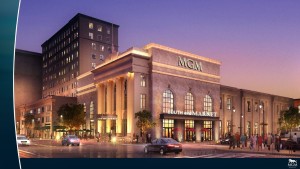
MGM’s Springfield casino faces a new threat from a proposed competitor in nearby East Windsor, Connecticut.
Let’s face it, maybe Mitt Romney wasn’t so crazy after all when he proposed having casino-rich Connecticut effectively bribe Massachusetts to stay out of the gambling business.
A straight-laced kind of guy, Romney was not a big casino fan when he was governor back in the mid-2000s.
Romney’s plan was to recover some of the revenue flowing into Connecticut’s coffers, courtesy of all the Massachusetts gamblers playing the slots at Mohegan Sun and Foxwoods. And with Connecticut moving to plunk a third casino near the Massachusetts border, Romney’s long-lost idea increasingly looks prescient.
The Connecticut Senate recently voted to give a green light to a proposal by the Mohegan and Mashantucket Pequot tribes to build a $300 million “satellite” casino in East Windsor. The key detail here: East Windsor is a mere 20-minute drive from downtown Springfield, where MGM is building a nearly $1 billion million casino resort.
Connecticut’s aggressive pushback casts a shadow over hopes the new MGM Springfield will become an economic development magnet for beleaguered Western Massachusetts. And it raises the prospect the new Springfield casino may instead face an all-out battle for survival from a competitor on its doorstep, bankrolled by two of the largest casinos in the world, Foxwoods and Mohegan Sun.
MGM’s plans for its Springfield casino were always grand and went way beyond being the hometown entertainment hub for the Pioneer Valley. The Las Vegas giant envisioned a gambling resort that would draw gamblers from far beyond the bounds of battered Springfield, the poorest city in the state. MGM’s business plan has built on the prospect of drawing gamblers from across the region and from deep into Connecticut and the relatively affluent Hartford area.
Ranked by median income, the Greater Hartford area is No. 8 in the country – just one peg below Greater Boston.
Beyond Struggling Springfield
But the Mohegan/Foxwoods plan to build a border casino throws a very big monkey wrench into MGM’s plans.
Sure, the new MGM Springfield will attract quite a crowd when it opens next summer. But the excitement and hype will fade after a few weeks, as it typically does for a new casino. And when and if a new Connecticut casino opens a short-drive down I-91 in East Windsor, that flood of gamblers from across the border will soon slow to a trickle.
Convenience is huge in the gambling business. And once the novelty wears off, the number of Connecticut residents who will insist on driving past the new Mohegan/Foxwoods casino for another 20 minutes to get to the new MGM Springfield will be limited, casino industry experts say.
MGM’s Springfield casino will also face a newly raised competitive wall to the west in New York State as well, with newly opened, Las Vegas-style $330 million Rivers Casino in Schenectady adding to the large racino in Saratoga that has been around for years.
The end result is the new MGM Springfield may face a shrunken market, reduced to the environs of Springfield and Western Massachusetts, before it can even get onto its feet.
The least populated and arguably most economically struggling part of our state, Western Massachusetts seems an odd candidate to support a nearly $1 billion casino. The idea was to bring in gamblers, tourists and shoppers from outside the region to spur the local economy, not churn the same dollars around.
As the Connecticut threat takes shape MGM’s been throwing everything and the kitchen sink into an all-out bid to keep legislation for Connecticut’s third casino from getting across the finish line.
While the proposal for a third casino made it through the Senate, it still has to clear the House. And MGM, with an aggressively lobbying campaign that features letters opposing the new casino from Sen. John McCain and former Interior Secretary Ken Salazar, has done a good job of muddying the waters. MGM is also pushing its case in the courts, and we probably haven’t heard the last of those efforts.
The Las Vegas-based casino giant clearly knows what’s at stake here.
All of which brings us back to Romney’s idea, way back when, of having Connecticut pay Massachusetts to stay out of the casino business.
The proposal was snubbed by Connecticut’s governor and by lawmakers in both states, with Romney, as usual, seen as a bit too clever for his own good.
The Mittster’s pay off plan wouldn’t have boosted economic development, though the money Massachusetts made from the scheme could certainly have been pumped into redevelopment initiatives in Springfield and elsewhere.
To be fair, MGM’s big bet on Springfield is one that may yet pay off for the struggling city, which has a number of other redevelopment initiatives separate from gambling that it is also focusing on.
But Connecticut’s move to build a third casino on the Massachusetts border is a major threat to those dreams of renewal, raising the prospect of oversaturation in a market that wasn’t so hot to begin with.
So Romney may have been scoffed at, but who’s laughing now?









